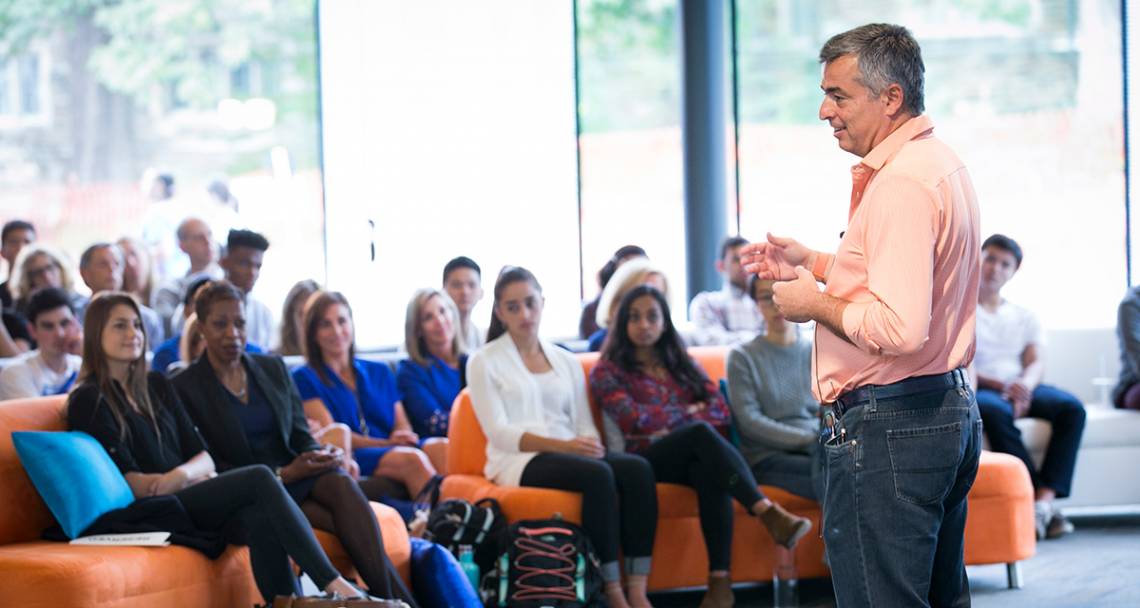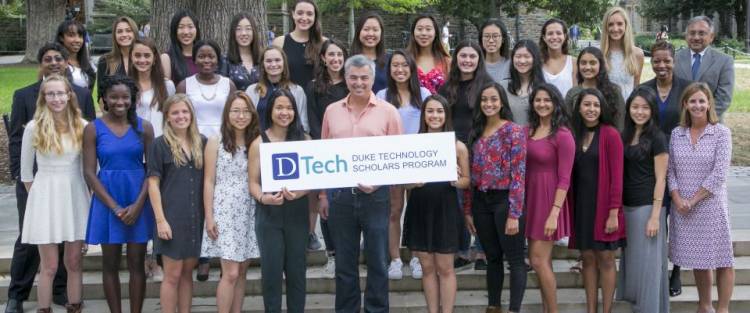Duke Alumnus, Apple Innovator Eddy Cue Helps Promote DTech Program
Duke expands effort to inspire more women to enter computer science and electrical engineering

Some of the most iconic Apple products – the online store, the iTunes music shop and the App store – came out of the work involving Duke graduate Eddy Cue, ’86, Apple’s senior vice president of internet software and services. That made him the right person to meet with the Duke Technology (DTech) Scholars, an effort to inspire more Duke women undergraduates to choose careers in computer science and electrical & computer engineering.
DTech provides the scholars with a variety of hands-on experiences, internships, workshops and mentor relations to help them succeed in a field where women remain underrepresented. The goal is to create a pipeline of women who will thrive in a crucial industry for American society.
Cue was on campus Sept. 29 to help celebrate the expansion of the DTech program, a joint initiative of Duke’s Departments of Computer Science (CS) and Electrical and Computer Engineering (ECE) launched in 2016. In meeting with students from DTech, CS and ECE, he discussed ideas of leadership, his career at Apple and the need for the technology industry to attract the best talent from the most inclusive pool of experiences. “Duke changed my life,” Cue told the students.
“Everyone has certain skill sets; they just have to have opportunities to find them and use them,” Cue said. “And that’s what most people don’t have. When you look at DTech, it’s a problem we have in the US, and it’s something we want to address so women have the same opportunities in technology in men.”
Below, two DTech Scholars talk about Eddy Cue’s visit and how DTech is opening opportunities for them in their field. Catherine Wood is a senior mechanical engineering student with an ECE minor. Nigel Malaba, a Duke MasterCard Foundation scholar, is an electrical and computer engineering senior.
Q. How has DTech been valuable in attracting you to this field and helping you stay on course?
Catherine Wood: When DTech was first launched I was already fully invested in pursuing a degree in mechanical engineering. However, as a sophomore with little experience, it was very difficult to find an internship — much less an internship in the Bay Area. DTech helped open doors for me that I didn’t even know existed. They introduced me to Carbon, where I interviewed and received an internship position. I returned there as an intern this past summer as well.
Nigel Malaba: The program did attract me to software engineering. I was already studying electrical and computer engineering but had not thought of the fact that I can actually be a software engineer. Being a part of the program has exposed me to the technical world through my internship at Aeris in Silicon Valley. Being surrounded by software engineers in addition to being one myself gave me an understanding of how and what a software engineer does as well as the option that I can become a software engineer.
Q. There’s a strong focus on mentorship in the program. How has that been useful to you?
Catherine Wood: I have now been a part of DTech for two summers and have been assigned two mentors. Both of my mentors have been amazing. My mentor from the first summer I still talk to on a bi-weekly basis and I feel like I am developing a relationship with her that will last hopefully much longer than my college career. More than anything, both of my mentors have provided an outlet to talk to and bounce ideas off of that are not my parents. They have provided guidance that has taught me how to interact and communicate with people in a more formal context.
Nigel Malaba: Having a mentor over the summer was one of the best aspects of the program. My mentor was Monica Kumar, the VP of database at Oracle. She was an amazing support and really cared about my well-being during my internship. She was deeply invested in my career interests--she set up a meeting for me with the VP of product management at Oracle as I had expressed interest in being a PM at some point in my career. She introduced me to amazing people in the valley and gave me invaluable advice throughout my summer experience.

Q. Where are you finding barriers in these fields and how is the program helping you with those?
Nigel Malaba: I definitely still struggle with software interviews and it's because I need more practice with computer science as I have focused more on hardware in my ECE career. As much as I can solve problems and become a great software engineer on the job, I still find it difficult to go through the conventional interviews offered by most tech companies. So, I have made the decision to shift my focus to other areas of tech such as hardware engineering in which I have the skills to succeed. I am passionate about integrated circuit design and building electrical systems and that's what I'm looking to do as a career immediately after graduation.
Q. What has been valuable about the summer program?
Catherine Wood: On top of the internship and mentorship aspects of the program, one of the most valuable aspects of this program is the housing component. Each scholar is assigned to a house with 7-9 other scholars who are also interning in the Bay Area. What is great about this aspect of the program is that I got to come home every day to people sitting around the kitchen table just chatting about work or life. It was unbelievably helpful to have that immediate support system when you came home. Since we were all going through similar situations, it was easy to bounce ideas off of each other and brainstorm how to solve problems at work. It’s hard to quantify how valuable having a strong community back at home is, but it really makes all the difference in the world.
Q. What do you value about the opportunity to interact with people like Eddy Cue?
Catherine Wood: When people give talks, they normally have something that they want to say. However, what is unique about this experience is that we got to ask him questions. And while I am sure that he has answered all of these questions a hundred times and probably has his answers down pretty well — it is an opportunity for us to really shape what our interaction with him is like. I think it is also just an incredible experience to actually get to talk to someone who has succeeded in the tech industry for so long and really get to understand more about his journey and the lessons that he learned along the way.
Nigel Malaba: Meeting Eddy Cue for lunch was really exciting for me! It reminded me of the time I met Gayle McDowell through DTech. [Gayle McDowell is the author of “Cracking the Coding Interview” who had dinner with DTech students at her house this past summer.] Eddy Cue gave very insightful advice about entering the technology field and told us his background as a computer science major at Duke. He was very casual as he conversed with us and that allowed us to give him our feedback about the program and share our experiences as DTech scholars as well as our career aspirations.
Learn more about DTech at dtech.duke.edu.